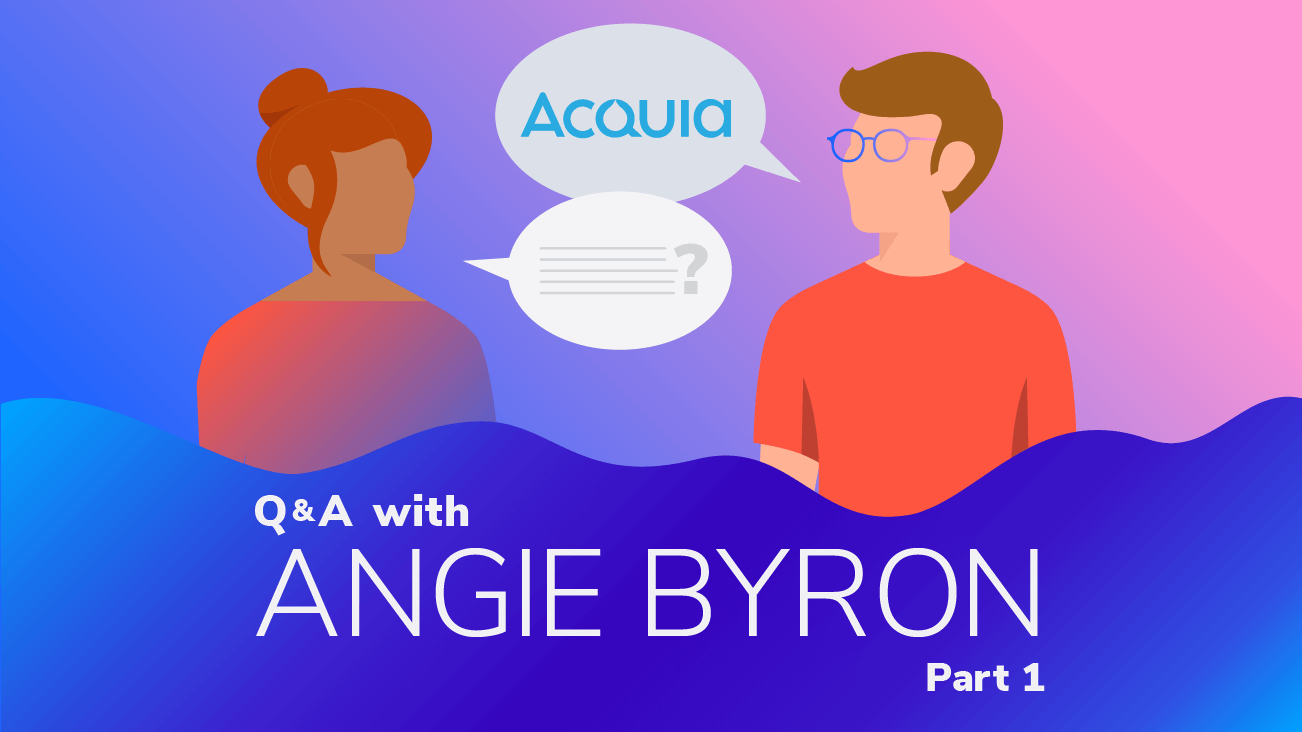Q&A With Drupal‑Expert Turned Acquia Pro: Angie Byron, Part 1

Angie Byron is a driver of innovation in technology. It is people like her who make open source truly open to new ideas not only by being a mentor to masses of people — giving them the encouragement and training needed to get their ideas into the contribution queue — but also by doing the hard work of reviewing and approving them as a co-maintainer of the Drupal project. Her recognitions and accomplishments include being featured on the front-page of Linux Journal, winning Best Contributor at Google-O'Reilly Open Source Awards, and co-authoring "Using Drupal" published by O'Reilly.
Angie works as Senior Director, Product + Community Development at Acquia; we’re so grateful that we were able to snag some of Angie’s time to ask her a few questions about the Drupal industry and community. Hope you enjoy!
Question & Answer With Angie Byron: Part 1
| Angie Byron, Senior Director, Product + Community Development, Acquia |
Q: As someone known throughout the Drupal community as "webchick," what are your suggestions for newcomers as they take on the daunting task of selecting a drupal.org username?
Angie (Byron): For me, I chose that moniker because I wanted to be "out and proud" as a woman in tech, and also identify my passion in the process (the web and everything about how it works, connects people, provides access to knowledge, etc.). So that's definitely one way to go about it.
Other people use their actual names (capital letters and spaces are allowed) so their contributions are credited to them directly, and still, others use their 1996 Hotmail usernames or just random words that spring to mind. 😉 It's a very personal choice, and I encourage folks to trust their gut!
One pro-tip, however: if you ever end up regretting your username choice, you can always change it in your Drupal.org account!
Q: How has your relationship to Drupal changed over the years, and how did you adapt as your role in the community changed?
Angie: When I first got involved with Drupal it was as a Google Summer of Code student, so my work with Drupal was basically an internship over a summer, after which time I fully expected to go and get a "real" job building boring accounting applications or whatever. Instead, I accidentally found myself building a freelance Drupal development business, which led to being hired by multiple Drupal companies as a developer and then architect, which then eventually lead to my current position as Sr. Director of Community + Product Development for Acquia, which is more about supporting Drupal and its community.
There was a distinct point in time where I applied to become the core co-maintainer of the Drupal 7 release, and this was sort of a "fork in the road" — continue down the path of working on individual features and bug fixes as a developer, or transition into more of a organizer/empowerment role, to help other developers (and designers, and documentation authors, and…) achieve their goals. I felt the impact of the latter was much higher (plus, hunting down missed semi-colons is only fun for so long), and this decision eventually resulted in coordinating the efforts of nearly 1,000 contributors on the Drupal 7.0 release in January 2011.
After that, I approached Dries [Buytaert] (Drupal project lead) about making this sort of work my actual *job* job (as opposed to largely squeezing it out of nights and weekends and family time), and am happily employed at Acquia to this day, doing Drupal community coordination full-time!
Q: Can you share one memorable learning moment that challenged you and pushed you out of your comfort zone?
Angie: Drupal was originally on the CVS version control system, which was a fine decision back in 2000 when Drupal was first founded, but became less and less so as other, much better competitors surfaced over the years. Ten years later, while everyone universally agreed we should not be on CVS anymore, no one could agree on what to move to instead.
After the 7th or 8th time of going around in circles on this, I decided to leap into the fray and shepherd a "community discussion to end all community discussions" to flesh out the pros, cons, whys, and wherefores of Subversion vs. Bazaar vs. Git, interviewing developers, canvassing what contributed Drupal code was already available for these systems, gathering up volunteers, etc.
It was extremely difficult work since there were a lot of VERY strong opinions, most of them counter-acting one another, and no clear "right" answer. In the end, though, we arrived at the recommendation to switch to Git, and this was absolutely the best choice, not only for our project but for basically all projects of the future it turns out, as GitHub (later) came into vogue.
Q: How has Drupal evolved over the years and how have things changed (for better or for worse) since Drupal moved "off the island"?
Angie: I strongly believe that Drupal has evolved for the better over the years. There have been major improvements to maintenance and we keep seeing more and more experts being brought on who are fully dedicated to product feature updates. These enhanced capabilities are making everyone’s lives easier — no matter what scale project a developer is working on.
An item that we’re focused on in the short-term is tighter alignment between Acquia and other applications in order to be able to address code fixes before something breaks so that it doesn’t slow teams down.
Q: What's your prediction for where Drupal will be in 5 years? Features, number of sites running Drupal, etc.?
Angie: Drupal has revolutionized the way we can create websites for people who don’t know how to code. You can now set-up a Drupal website (especially in D8) with check marks and the click of a button. In the future, it would be great to see that for decoupled sites, as well.
Drupal currently powers 2.3 percent of the web and I, personally, would love to see that number reach 5 percent. We are working on an "Automatic Updates Initiative" which would help drive some of that growth. This will enable you to use Drupal for small sites that don’t require maintenance, bringing the total cost of ownership down significantly and allowing access to a much wider group of people.
Q: What modules would you like to see move into Drupal core?
Angie: We’ve moved a lot of them into Drupal core already, which is great! Drush is now available out of the box in Drupal core. I’d love to see the Rules Module or something like it added to Drupal core. Being able to create a set of actions you want to fire based on a trigger elsewhere in the solution presents so many options. It’s great for spam control or even facilitating functions that enable more flexibility like disabling comments on posts after a certain timeframe.
We’re also fleshing out data migration capabilities of Drupal 8. Once we nail this, we can’t wait to see the effects it has on adoption.
Q: Do you have any thoughts on the upcoming Drupal migration to GitLab and the impact it will have on contributors both new and old?
Angie: This will probably be the single-handed best thing we do for our user-base. We are really excited for the change to reduce friction from traditionally separate activities and enable integration. I believe Phase 2 integration will have a transformative effect.
Q: What impact has the decoupled CMS trend had on both Drupal and the CMS landscape as a whole?
Angie: It has forced us to take a look at the underlying architecture and make changes to the API. Previous to D8, a lot of validation was form-centric. D8 has forced us to pull that up a level and focus on the entities. D8 has been all about bolstering Drupal up in two completely different scenarios. One being decoupled Drupal and two being trying to build out the features of Drupal (PHP-powered templating system).
We will need to reconcile these in D9, taking into account the best usability but also how developers will continue to consume this.
Editor's Note: learn more about decoupled in our recent post: Exploring Decoupled Drupal Through the Eyes of a Front-End Themer.
Q: As a female leader breaking down barriers in a historically male-dominated industry, what trends have you witnessed around women in Drupal? Have you noticed any trends around diversity and inclusion in the Drupal community?
Angie: The industry continues to evolve and it’s so exciting to see the progress. My very first DrupalChix BoF (birds of a feather) session was in Barcelona with 11 other women. Fast-forward to DrupalCon San Fran in 2010 where there was an entire room full of women (60-70) in attendance. We’ve worked really hard to create places for women in Drupal to congregate and it’s very rewarding to see parties for women in Drupal, most recently at DrupalCon Seattle, reach in the hundreds of attendees.
In 2015/2016, we started a splinter group called Drupal Diversity & Inclusion to address more specifically gender, racial, sexual orientation and geographic disparity. That group has done a whole lot of work to drive diversity. The Drupal Association has joined forces and is working to address speaker diversity at events and conferences. We’re slowly starting to see progress being made where more and more speakers are identifying as having come from one of these diverse groups — which is great!
In intentionally growing the number of people who have a platform, the number of people holding a Drupal board position, or holding a leadership role within the community — we’re able to bring a greater perspective to solve problems and effect change more readily.
We hope you enjoyed Part 1 of our Q&A with Angie Byron, Senior Director, Product + Community Development at Acquia and are excited to have spent some time talking more with Angie about the Drupal community and the support Acquia has provided along the way.
To hear more on Angie’s take on joining the Drupal community as a newcomer and how Acquia continues to impact the future of Drupal check out Part 2 of the series!



